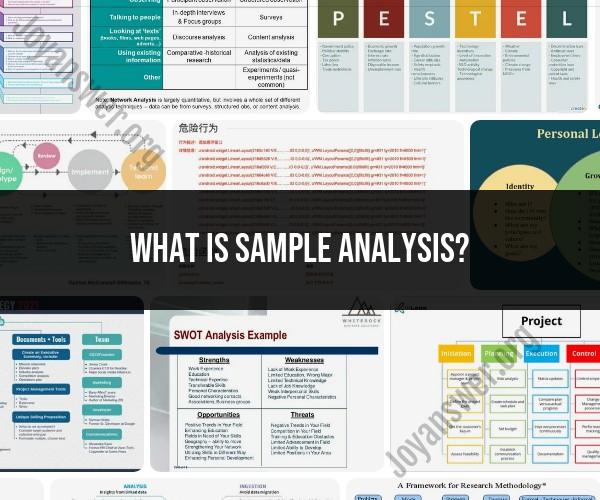What is sample analysis?
Sample analysis refers to the process of examining and evaluating a small portion or representative portion of a larger entity, substance, data set, or population to draw conclusions, make inferences, or gain insights about the entire whole. This method is commonly used in various fields, including science, research, quality control, and business, to gather information, test hypotheses, make decisions, or monitor and improve processes.
Sample analysis involves the following key steps:
Sampling: Selecting a portion of the whole that is representative and unbiased. This can be done through random sampling, stratified sampling, or other methods, depending on the research or analysis objectives.
Data Collection: Gathering data or information from the selected sample. This could involve surveys, measurements, observations, or other data collection techniques, depending on the nature of the analysis.
Data Processing: Organizing, cleaning, and preparing the collected data for analysis. This step may also include data transformation and conversion.
Analysis: Applying statistical, analytical, or other methods to the sample data to draw conclusions, make predictions, or uncover patterns and insights.
Interpretation: Interpreting the results of the analysis in the context of the larger population or entity. This involves making inferences and generalizations based on the sample data.
Reporting: Communicating the findings of the sample analysis through reports, presentations, or other means to stakeholders, decision-makers, or the broader audience.
Sample analysis is essential in various fields and applications. For example:
- In scientific research, scientists often analyze a small sample of a substance or group of individuals to draw conclusions about a larger population.
- In quality control, manufacturers may take samples of their products to ensure they meet certain standards and specifications.
- In market research, businesses analyze samples of consumer data to make informed marketing and product development decisions.
- In healthcare, medical professionals may conduct diagnostic tests on a blood sample to assess a patient's health.
Effective sample analysis is crucial for making informed decisions, reducing costs, and minimizing errors or biases when dealing with large or complex datasets or populations.












